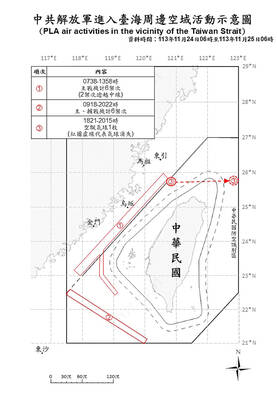The Ministry of National Defense yesterday tried to end recriminations surrounding a series of mishaps during the Hankuang No. 19 exercises earlier this month.
"All the major weapons systems of the armed services were put to test in the exercise. These tests were very important since they offered vital data about the weapons systems being tested," a ministry news release quoted Chief of the General Staff Admiral Li Chieh (李傑) as saying.
"There were some weapons systems that failed the tests. These failures should not be ignored. Their causes must be found," Li said.
Li was speaking at a meeting to review the exercise on Wednesday to discuss why the exercises had so many problems, the ministry said.
Li said one of the problems the ministry would be investigating was a torpedo that had to be prematurely detonated after it went out of control.
The ministry denied that Li faulted the navy for the incident, as reported by a Chinese-language newspaper yesterday.
The report said Li reprimanded the navy for insufficient training before the exercises.
Li was previously a commander-in-chief of the navy who specialized in submarine warfare.
The ministry will also investigate why a Standard SM-I air-defense missile fired from a Chengkung-class frigate missed its target and mistakenly shot down a drone intended as a target for a Mica air-to-air missile to be launched from a Mirage 2000-5 fighter. The military had to cancel the launch of the Mica.
The problems during the exercises were an embarrassment for the military, the navy in particular.
A naval officer who was involved in the exercises said the navy should not be made the scapegoat since it was the army that designed the war games.
"Take the SM-I incident as an example," the officer said.
"According to normal operation procedures, the navy should not have been asked to fire the SM-I at a target within visual range. The arrangement was apparently aimed at pleasing the spectators at the scene."
"It was not really a mistake that the SM-I missile missed its intended target drone and went for another target further away. The missile was designed to find any hostile target in the air that posed a greater threat.
"The target drone intended for the Mica was selected by the missile possibly because of its flying speed and angles," he said.
"As to the torpedo which went out of control in the exercise, the navy should not be blamed, either.
"The torpedo was of the SUT type manufactured by Germany. It was brought in through irregular channels over a decade ago," he said.
"There is no post-sales service for these SUT torpedoes.
"They are like products bought on the black market. No one can guarantee the quality and life of these torpedoes," he said.

Taiwan’s passport ranked 34th in the world, with access to 141 visa-free destinations, according to the latest update to the Henley Passport Index released today. The index put together by Henley & Partners ranks 199 passports globally based on the number of destinations holders can access without a visa out of 227, and is updated monthly. The 141 visa-free destinations for Taiwanese passport holders are a slight decrease from last year, when holders had access to 145 destinations. Botswana and Columbia are among the countries that have recently ended visa-free status for Taiwanese after “bowing to pressure from the Chinese government,” the Ministry

Theaters and institutions in Taiwan have received 28 threatening e-mails, including bomb threats, since a documentary critical of China began being screened across the nation last month, the National Security Bureau said yesterday. The actions are part of China’s attempts to undermine Taiwan’s sovereignty, it said. State Organs (國有器官) documents allegations that Chinese government officials engage in organ harvesting and other illegal activities. From last month to Friday last week, 28 incidents have been reported of theaters or institutions receiving threats, including bomb and shooting threats, if they did not stop showing the documentary, the bureau said. Although the threats were not carried out,

HEALTHCARE: Following a 2022 Constitutional Court ruling, Taiwanese traveling overseas for six months would no longer be able to suspend their insurance Measures allowing people to suspend National Health Insurance (NHI) services if they plan to leave the country for six months would be abolished starting Dec. 23, NHIA Director-General Shih Chung-liang (石崇良) said yesterday. The decision followed the Constitutional Court’s ruling in 2022 that the regulation was unconstitutional and that it would invalidate the regulation automatically unless the NHIA amended it to conform with the Constitution. The agency would amend the regulations to remove the articles and sections that allow the suspension of NHI services, and also introduce provisional clauses for those who suspended their NHI services before Dec. 23, Shih said. According to

‘GRAY ZONE’ TACTICS: China continues to build up its military capacity while regularly deploying jets and warships around Taiwan, with the latest balloon spotted on Sunday The US is drawing up contingency plans for military deployments in Japan and the Philippines in case of a Taiwan emergency, Japan’s Kyodo news agency reported. They would be incorporated in a first joint operation plan to be formulated in December, Kyodo reported late on Sunday, citing sources familiar with Japan-US relations. A US Marine Corps regiment that possesses High Mobility Artillery Rocket Systems — a light multiple rocket launcher — would be deployed along the Nansei Island chain stretching from Kyushu to Yonaguni near Taiwan, Kyodo said. According to US military guidelines for dispatching marines in small formations to several locations,